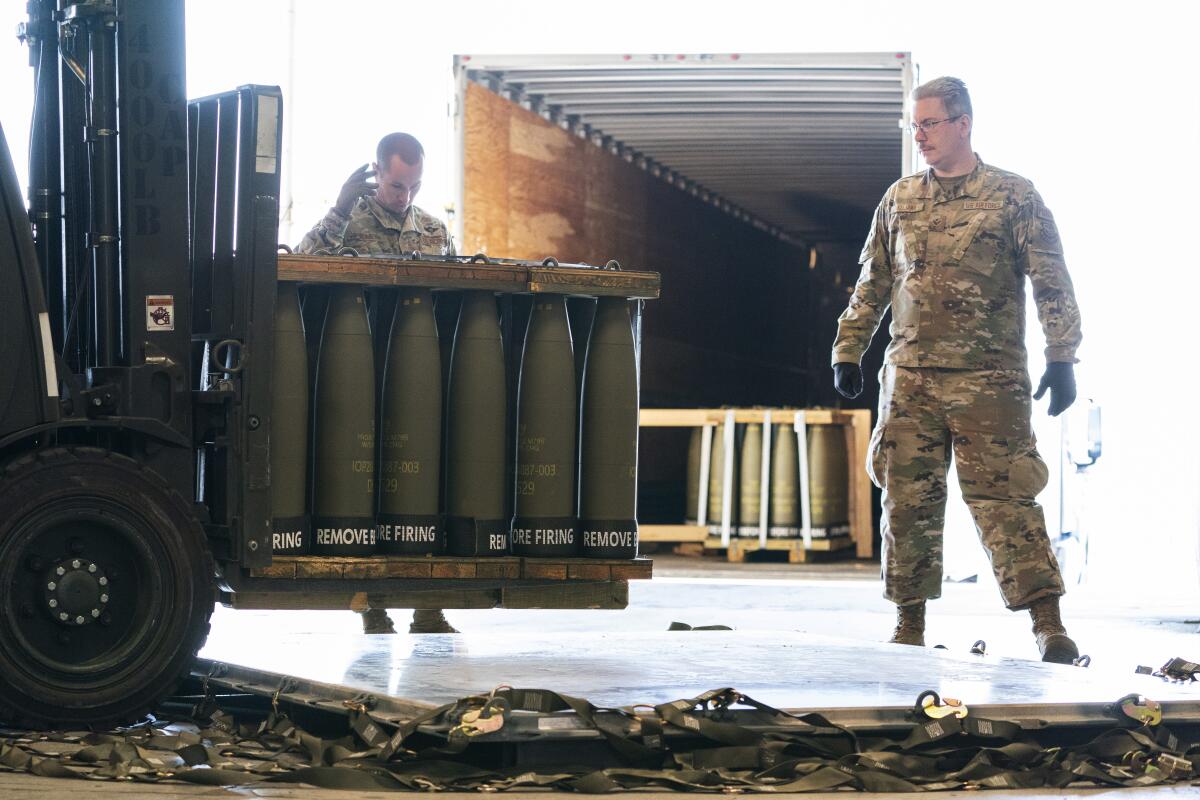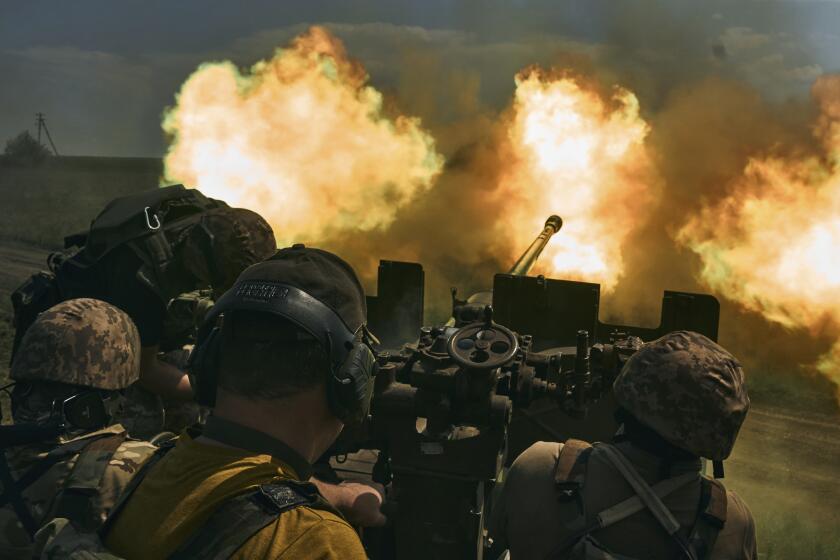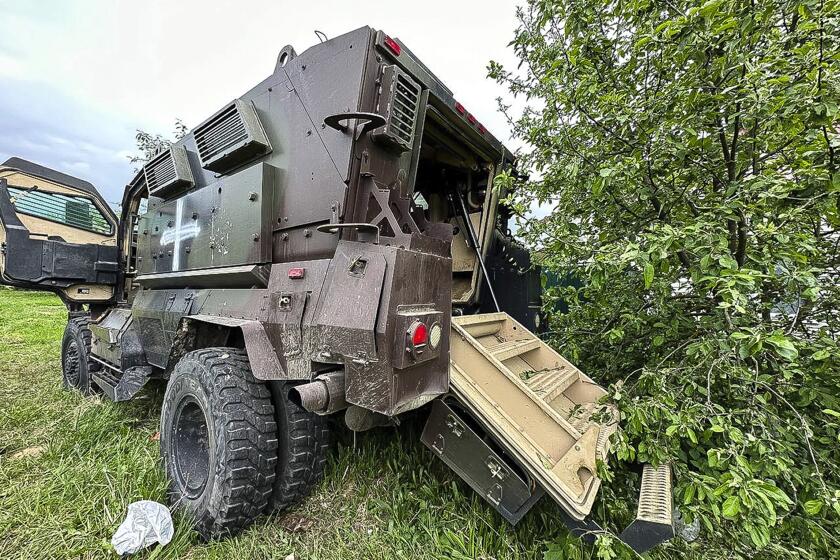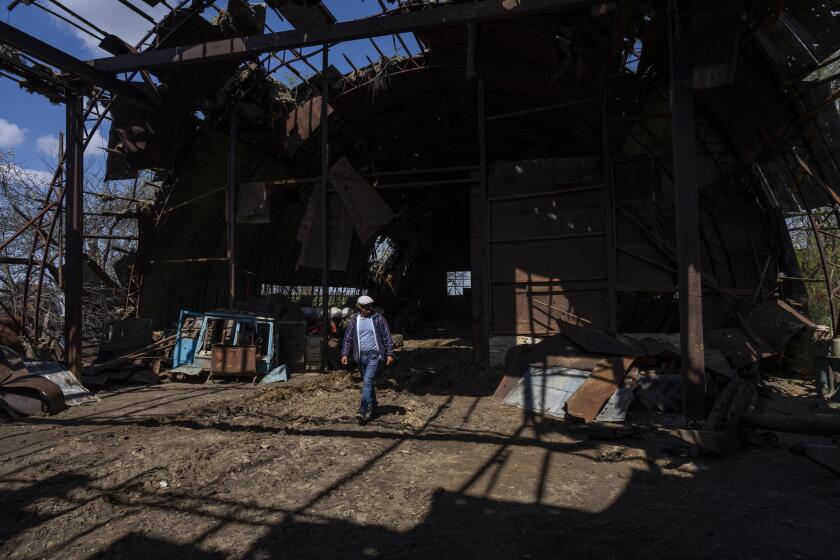Half of U.S. public approves of continued weapons deliveries to Ukraine

- Share via
WASHINGTON — Like the blue-and-yellow flags that popped up around the U.S. when Russia invaded Ukraine 15 months ago, American popular support for Washington’s backing of Ukraine has faded a little but remains widespread, a survey by the University of Chicago’s Harris School of Public Policy and NORC shows.
It found that half of the people in the U.S. support the Pentagon’s ongoing supply of weapons to Ukraine for its defense against Russian forces. That level is nearly unchanged in the last year, while about a quarter are opposed to sustaining the military lifeline, which has now topped $37 billion.
Big majorities among both Democrats and Republicans believe Russia’s attack on Ukraine was unjustified, according to the poll, which was taken last month.
And about 3 out of 4 people in the U.S. support Washington playing at least some role in the conflict, the survey found.
The findings are in line with what Ukraine’s ambassador says she sees when she makes appearances at think tanks, dinners, embassy parties and other events to rally vital U.S. backing for her country.
“I feel the support is still strong,” Ambassador Oksana Markarova said, even as tensions with China, domestic politics, mass shootings and other news often top the Ukraine war in U.S. news coverage these days.
The Pentagon overestimated the value of the weapons it has sent to Ukraine by at least $3 billion, freeing up more funds for additional aid to Kyiv.
“There are other things happening at the same time,” she said. “But I feel the very strong bipartisan support.”
When it comes to specific kinds of U.S. backing for Ukraine, popular support for U.S. sanctions against Russia has experienced the most significant drop, falling from 71% a year ago to 58% this spring, although that’s still a majority.
The decline in support for the sanctions may reflect people’s concern that the efforts to isolate Russia economically have contributed to inflation, analysts said.
Overall, however, the findings show that a couple of early reservations U.S. policymakers had about the strong material assistance for Ukraine have yet to be realized: that public support would crater if the war dragged on, and that the heavy assistance to Ukraine would become a partisan wedge issue, splitting Democrats and Republicans.
The head of the Russian private army Wagner says his force lost more than 20,000 fighters in the drawn-out battle for Bakhmut in eastern Ukraine.
“There’s no ground-swelling of American Ukraine fatigue here, and that has always been the fear,” said Samuel Charap, a senior political scientist at the Rand Corp. research center.
For Cameron Hill, a 27-year-old state employee and Republican in Anadarko, Okla., there is much to dislike about Russia’s war and its leader, President Vladimir Putin: the statements from Putin that Hill took as misleading propaganda, his heavy-handed rule and Russian fighters’ attacks on civilians and other abuses.
From the start of the Ukraine war, “there was killing of civilians, raping,” Hill said. “It didn’t seem like a moral-run military in the first place.”
By contrast, video showing the courage of a Ukrainian fighter as he appeared to be executed by Russian fighters stood out to Hill. “His last words were something along the lines of ‘Slava Ukraini,’” or Glory to Ukraine, Hill said.
Russia’s war has forced Ukraine’s grain farmers into a vicious dilemma, risking mines if they want to plant crops.
The vast majority of U.S. adults believe that Russia has committed war crimes during the conflict, including 54% who say Russia is the only side that has done so. The International Criminal Court at the Hague in the Netherlands in March issued arrest warrants for Putin over Russia’s mass deportation of Ukrainian children.
Older adults are more likely to view Russia’s invasion as an unjustified attempt to overthrow Ukraine’s government — 79% among people 45 and older, compared with 59% for those 44 and under.
In all, 62% regard Russia as an enemy — or top enemy — of the United States. And 48% are very worried about Russia’s influence around the world. At the same time, 50% say they have a favorable opinion of the Russian people, compared with 17% who have an unfavorable view.
Only 8% of people in the U.S. say they have a favorable view of Putin.
Start your day right
Sign up for Essential California for the L.A. Times biggest news, features and recommendations in your inbox six days a week.
You may occasionally receive promotional content from the Los Angeles Times.
Americans’ view of Russia and its leader has already been a flashpoint in U.S. politics, as when Florida Gov. Ron DeSantis drew criticism this spring for dismissing Ukraine’s fight against Russian forces as a “territorial dispute.” The remark was associated with a drop in support for DeSantis, a prospective Republican presidential candidate.
When it comes to the war itself, “it’s unfortunate that it’s going on as long as it is. And I can’t imagine, you know, living there, and that would be my life every day, with bombs going off,” said Laura Salley, 60, a college mental health counselor in Easton, Pa., and a Democrat.
“But if we pull back, I’m pretty sure that Russia would find that as an opportunity to encroach again,” Salley said.
The poll of 1,180 adults was conducted April 13-17 using a sample drawn from NORC’s probability-based AmeriSpeak Panel, which is designed to be representative of the U.S. population. The margin of sampling error for all respondents is plus or minus 3.9 percentage points.
More to Read
Sign up for Essential California
The most important California stories and recommendations in your inbox every morning.
You may occasionally receive promotional content from the Los Angeles Times.













